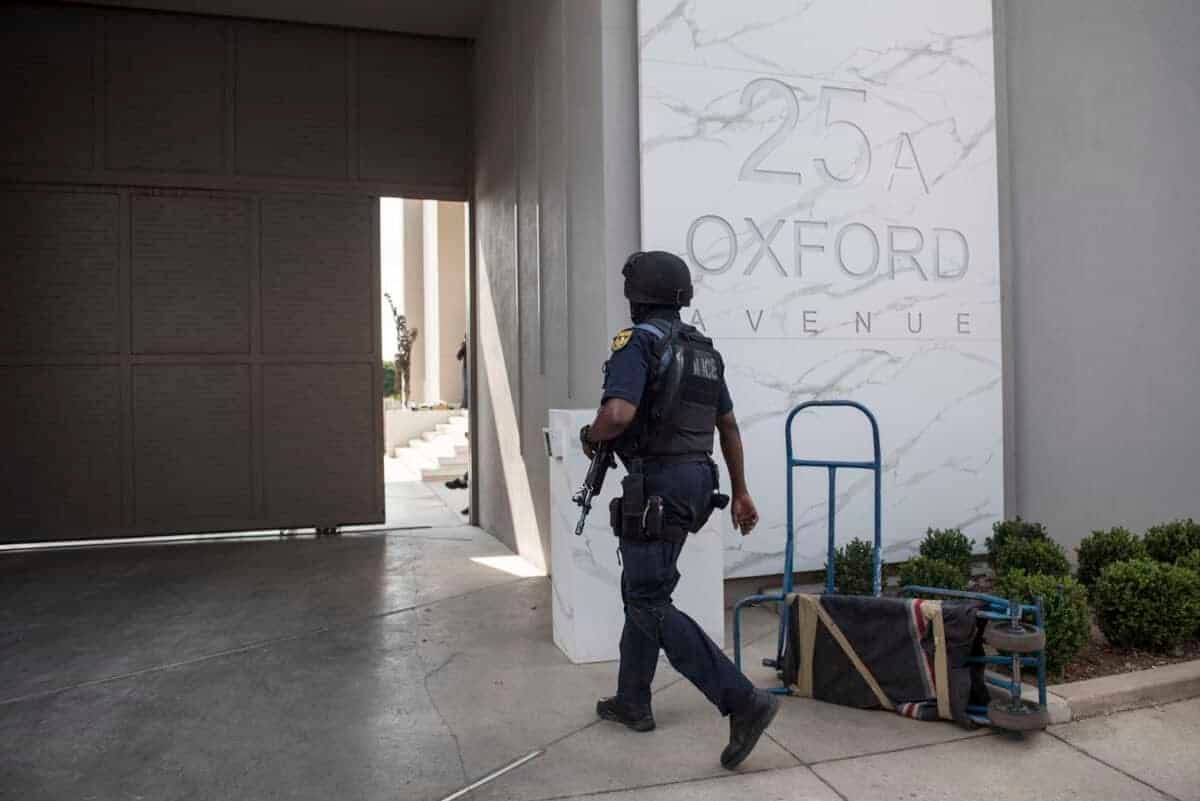Minister Aaron Motsoaledi says the SIU is targeting more luxury cars and properties linked to the R2 billion Tembisa Hospital corruption scandal.

Minister of Health Dr Aaron Motsoaledi says that more luxury asset seizures from individuals implicated in the R2 billion Tembisa Hospital corruption scandals are going to happen.
Earlier this month, Special Investigating Unit (SIU) officials seized luxury cars, homes and art belonging to alleged Tembisa Hospital tender kingpin Hangwani Maumela.
Maumela faces accusations of being a key beneficiary in the alleged corruption at Tembisa Hospital.
SIU not done with Tembisa Hospital-related seizures
The minister said the SIU is targeting more expensive cars and properties linked to the scandal.
“I want to confirm to this house that this is the tip of the iceberg. There are more cars that are more expensive than Lamborghinis, which we are targeting.”
ALSO READ: The contrasting tale of two Lamborghini owners …
“We are also targeting people who are waiting for government state officials because we are leaving their pensions,” Motsoaledi said.
This action is far from over, the minister said.
Ministers of the social services cluster appeared before the National Assembly for an oral question-and-answer session on Wednesday afternoon.
Maumela, Mogotsi and North West hospital food tender
ANC MP Masello Senne initially asked Motsoaledi whether he is aware of an R1 billion tender to supply food to hospitals and a nursing college in the North West. She also asked about its current status.
MPs also asked him whether individuals implicated in the R2 billion Tembisa Hospital corruption scandal, including Oupa “Brown” Mogotsi and Maumela, participated in this tender.
ALSO READ: ‘He thinks we’re kids’: Politicians not buying Ramaphosa’s claim that he doesn’t know Maumela
Motsoaledi said he was aware of the tender. He explained that the tender was divided into two phases, with the Brown Mogotsi Foundation receiving the first phase.
Mogotsi Foundation vs NW health department
The Brown Mogotsi Foundation interdicted the tender, arguing that the winning entity was not resident in the North West. The Supreme Court of Appeal granted the interdict.
The North West department of health appealed the ruling, but the Supreme Court of Appeal dismissed the appeal and granted the interdict, forcing the department to drop the tender.
The minister noted that the department advertised the second phase of the tender. Maumela applied, but authorities interdicted his bid due to high prices.
Motsoaledi emphasised that the Auditor-General disapproves of month-to-month contracts, which is the current situation due to the interdicts.
ALSO READ: ‘Not my close relative’: Ramaphosa distances himself from corruption-linked Maumela
“I thank the North West department of health for resisting entry of syndicates into their province, and I hope they keep it that way,” he said.
MPs also asked the minister about officials who engaged with companies linked to the Tembisa Hospital corruption scandal, and how the department ensures ethical procurement across provinces.
Motsoaledi explained that the National Health Council held a meeting where the SIU presented its report. The department also called a special workshop to revise tender rules.
Blacklisted companies list
He confirmed that the department has initiated a forensic audit of all national tenders and is working to make a national database of blacklisted companies accessible to the media.
The minister added that the SIU will provide the list of companies to be blacklisted, and Treasury will manage the process.
ALSO READ: Lesufi suspends Gauteng health HOD, calls made to place department under administration
“We agree with the SIU that they must extend their investigation, and so they will have to extend the proclamation. So, we don’t think there’s anywhere to hide,” Motsoaledi said.
Meanwhile, there is ongoing turmoil related to appointments in the department of social development (DSD) as the director-general (DG), Peter Netshipale, is facing disciplinary action.
Officials allegedly acted dishonestly by signing a five-year employment contract when the Cabinet had approved only a one-year tenure.
Watch the social services ministers answer oral questions here:
DSD director general drama
Netshipale faces charges of bringing the department into disrepute following an exposé of questionable appointments in the minister’s private office.
uMkhonto weSizwe party MP Nokwethemba Mtshweni asked Minister Sisisi Tolashe what actions the department has taken. The question focused on alleged fraud in Netshipale’s employment contract.
ALSO READ: Tolashe accused of lying to parliament on director-general contract
Mtshweni also asked why the DG can still make binding administrative and financial decisions. She questioned this while the DG’s appointment is under scrutiny.
“While in the process of finalising a forensic investigation, in order to get to the bottom of this matter, I want to place it on record that this investigation is not a witch hunt intended to throw anyone under the bus,” Tolashe said in response.
The minister said the “administrative error” in the DG’s contract has been ratified to align with Cabinet’s decision. Netshipale is currently on a one-year contract.
‘Administrative error’
Tolashe emphasised that the DG’s appointment followed all necessary processes and protocols, and that he is accountable for his actions.
The minister also corrected “misleading” reports about the his suspension. She said that the reports are “part of a narrative to cast aspersions and discredit the department and its leadership.”
ALSO READ: Social development spokesperson ‘felt threatened’ after warning by Tolashe’s aide – report
The minister also addressed questions about the sudden change in the DG’s competence. She explained the need for oversight and accountability.
“There are no charges against the director-general of the DSD; instead, a process is unfolding for him to put in writing why I should not take action against him,” the minister said.
University of Fort Hare’s issues
The Chairperson of the Portfolio Committee on Higher Education and Training, Tebogo Letsie, asked the Deputy Minister of Higher Education and Training, Dr Mimmy Gondwe, a question whether the department is investigating the University of Fort Hare’s management. The investigation concerns allegations of poor governance, corruption, and unsafe residences that allegedly sparked violent unrest.
Letsie also asked how the department is intervening to restore stability and trust between management and students.
Gondwe said the department is engaging all stakeholders. These include the university council, executive management, student leadership, and labour unions. The goal is to assess governance concerns and restore stability.
ALSO READ: Fort Hare paid R17 million for work that was never done, investigation finds
The deputy minister said the university has been asked to provide a detailed report. The report must outline its plan to rebuild trust and reopen the institution safely.
“In the meantime, we’re also working with law enforcement agencies to ensure that there’s safety on campus, and we’re exploring ways to institutionalise dispute resolution mechanisms so that you know future disagreements do not lead to the level of violence and the decimation of property that we’ve seen,” she said.
When asked if the department will appoint an independent assessor to investigate the university’s governance issues, Gondwe said it is awaiting a report from the university. The department will decide on the next steps after reviewing the report’s contents.
Water infrastructure backlog
Finally, as the country faces an escalating water infrastructure backlog, Deputy Minister of Water and Sanitation David Mahlobo was asked how the department plans to accelerate investment, maintenance, and rehabilitation of key water infrastructure.
He was also asked how alternative water sources – such as reuse, desalination, and groundwater – will help secure South Africa’s long-term water supply.
ALSO READ: Dam levels consistently dropping in Cape Town: Here are the recent stats
Mahlobo explained that South Africa has fulfilled 90% of the Sustainable Development Goals.
However, the country still faces reliability issues with water supply. He noted a 67% reliability rate and 48% non-revenue water.
The deputy minister said there is a need for infrastructure projects costing over R100 billion.
These projects will require market funding and the establishment of the National Water Resource Infrastructure Agency.
Risk of infrastructure collapse
Mahlobo also responded to a follow-up question about the department’s assessment of provinces and municipalities at risk of infrastructure collapse.
He explained the implementation of turnaround plans for struggling municipalities, focusing on operational efficiency and capacity building.
“We’re making progress. We’re not out of the woods. We’re intervening in Johannesburg.
“We’re intervening; therefore, the reforms around metro trading services are a mechanism to support some of these municipalities… They are in ICU,” Mahlobo said.
NOW READ: Vaal Dam levels take a dip as rainy season arrives






